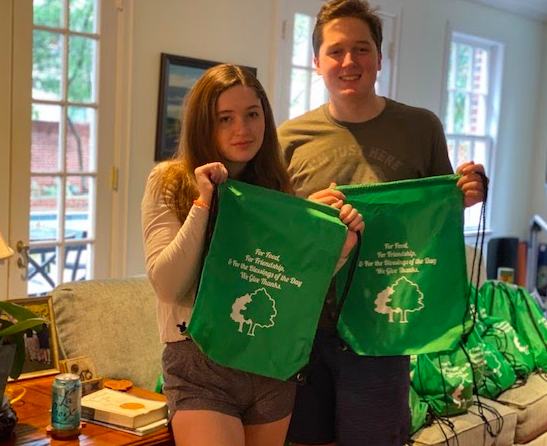Over winter break, several students pursued projects to serve their community through micro-grants from the Center from Service and Global Citizenship (CSGC). Students can apply for and use micro-grants to help others in ways that suit their own interests.
Ella Foulkes ’22 used her micro-grant funds to address the rising poverty in her home community. “I knew of many homeless shelters opening up for the season, and that’s a lot of at-risk people in tough environments,” said Foulkes. “I started to do some research and found that I could have the greatest impact by distributing facemasks and food. I decided to sew 40 face masks for the 37 people staying at a homeless shelter in Amherst, and bake and deliver 45 meals to people who I knew were having trouble getting [food].” In addition to providing masks and food, she also volunteered at a local food bank to help combat increasing food insecurity.
Lilian Regal ’24 leveraged her passion for crocheting by donating her crocheted items, like hats, to Warm Up America, a charity that accepts a variety of items and clothing for different causes. “I’ve been crocheting for a while, and I’d always wanted to be able to connect that with service,” she said. “This winter, I finally had the opportunity to get funding [from the CSGC]. I liked the idea of being able to help multiple causes at once,” Regal said.
Angel Zhou ’22 chose to focus on helping the senior citizens in her community in Shanghai. She interviewed fifty seniors and is currently developing a video about the stories they have shared. She decided to take this initiative after watching a Youtube video of seniors diagnosed with Alzheimer’s disease. “After watching this video, I felt like I should dedicate myself to helping seniors promote their thoughts and voices by the form of interview[s] and videography,” she said.
While the administrative process was relatively straightforward, there were definitely challenges along the way. Foulkes found that the precautions organizations took due to the pandemic hindered her original plan. “I was originally hoping to volunteer in the homeless shelter and actually distribute the food through there, but, understandably, they didn’t want people inside because of COVID,” she said. “That’s why [the project] took on a more independent nature.”
For Zhou, the process of filming constituted the main obstacle. “Many seniors were willing to be interviewed but not filmed, because they [were] worr[ied] about their faces being published into the public, so there [was] a lot of explaining before each interview,” she said.

The micro-grant projects not only served communities but also provided a valuable experience for each participant. For Regal, her project awakened her to the ease with which one could help those around them. “There’s so much need out there, and even one small thing can really help someone,” she said.
Foulkes shared a similar sentiment with Regal, saying, “I learned how much of an impact the smaller things can have.”
For Zhou, her project was a reminder of the impact the younger generation can make in the lives of the elderly. “Many of the seniors, who I interviewed, really appreciated me asking these questions. Some of them thought that by having this interview, their voices were being heard by the younger generation, and many others even felt as if this served as a great reflection for themselves,” she said.
When asked if they had any advice for other students with similar ideas for community service, many students emphasized the importance of taking initiative. Regal encouraged fellow peers to turn their ideas into reality. “This is a time of great need, so if you have an idea for something, and there are resources available, you should just go ahead and do it,” she said.

